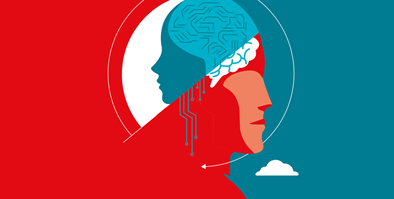by Reinald Krüger, Public Policy Development Director, Vodafone Group and Mikko Niva, Group Privacy Officer, Vodafone
While Artificial Intelligence (AI) has not yet reached its development potential, it is critical to its success that responsible companies have a clear idea about how to use this technology in a way that drives the best outcomes for our customers, employees and wider society.
Policy discussions on how to use AI ethically have similarly increased in recent years and there is very helpful guidance, particularly from the European Union (EU), and OECD that we have used to inspire the Vodafone AI Framework which we are launching today.

Photo credit: Vodafone
AI at Vodafone
AI will be a core part of the digital societies of the near future, providing us with new insights to solve problems and at Vodafone, we are already using it to help to improve our products and services and to run our business as effectively as possible.
‘TOBi’, our machine learning chatbot, is launched in 11 markets (with a further five to follow this year) and has proven very popular, for example in Italy, where two-thirds of customer contact is now automated, enabling our human customer agents to focus on the most challenging issues.
We deploy AI in some European and Asian markets within our radio access networks - the masts and poles that transfer communication from customer devices to our core network. AI algorithms anticipate where customers will need capacity - significantly improving coverage - and can optimise the handover of devices between cell sites, all leading to a reduction in network energy consumption of up to15%.
In just four years we have also built a large ‘big data’ team who use AI algorithms to process large, anonymised data sets to provide us with new business insights such as what offers will be relevant for different types of customers.
International Best Practice
However, only AI which is trustworthy, secure and robust has the potential to achieve mass market adoption and so we entirely agree with the European Commission that this technology needs a strong ethical framework grounded in fundamental human rights.
General Data Protection Regulation (GDPR) has already showed how the exercise of 'soft power' based on a strong rules based framework can shape global markets in a way that supports the EU's strengths and competitiveness. So if the EU is viewed as the standard bearer of trustworthy AI, we are confident that technology providers from the continent can become the global exporting powerhouses of the future.
Vodafone’s AI Framework
The introduction to the EU’s Ethics Guidelines for Trustworthy AI, states that, “AI is not an end in itself, but rather a promising means to increase human flourishing, thereby enhancing individual and societal well-being and the common good, as well as bringing progress and innovation.”[1]
We contributed to these ethics guidelines, published in April 2019. This has informed our own AI framework which focuses on six areas: transparency and accountability; ethics and fairness; the preservation of privacy and security; human rights, diversity and inclusivity; and maximising the benefits of AI while managing the disruption of its implementation.
By introducing this framework we are seeking to ensure that the AI technologies Vodafone creates and uses now and in future fully respect the human rights of our customers, particularly their privacy and security, but also protects them from any unintended consequences from utilising machine learning techniques.
Transparency and Accountability
We agree with the OECD that AI actors should commit to transparency and responsible disclosure, including enabling users to understand the outcome of using this technology.[2]
We should not pass off machines as human and so we will endeavour to inform Vodafone customers and employees clearly when they are communicating directly with AI-powered systems like TOBi.
We will also strive to provide clear and simple information about our collection of customer data and to provide fair and meaningful choices on how such data is used by Vodafone..
Ethics and Fairness
We support the underlying principles that humans should be in command of AI, using it to support and augment decision making.
Further, it is critical that the data we collect is not analysed in a way that leads us to make decisions inadvertently that affect any group or individual in an unfair way.
At Vodafone our teams responsible for big data are bound by a Code of Ethics for analysts and our processes are designed to ensure nondiscrimination and fair treatment.
We also want to make sure that the introduction of AI helps in closing the digital divide in our markets and are undertaking educational initiatives in a number of markets to raise broad awareness of new technologies.
Preservation of Privacy and Security
All of this activity is driven towards building customer trust which is our number one priority.
We will extend our existing strong privacy commitments, are working on an improved methodology to assess the human impact of a given AI data processing activity on the rights and freedoms of individuals and will make sure that our security systems for AI are continually updated as the threat landscape evolves.
Human Rights, Diversity and Inclusivity
We also agree with the Council of Europe that it is important to continue to develop a clearer understanding of AI and its impacts on human rights.
We will ensure that we respect international human rights standards and best practice around ensuring AI systems foster diversity, accessibility and inclusivity. We remain committed to engage actively in stakeholder discussions to build further understanding of the overall human impact of AI.
Managing the transition to AI
AI technologies may have an impact on the nature of the jobs that are undertaken in our organisation today. In recognition of that our framework concludes by committing us to help existing employees to gain new skills so that they can apply for digital roles as we seek to build diverse AI teams and accelerate the use of digital technologies across our business.
Building an inclusive digital society
At Vodafone we want to connect for a better future in order to build digital societies in which everyone can take part and be successful.
By publishing this framework we want to make clear our desire to use AI in an ethical and trustworthy manner, in line with other EU telecoms and technology companies, as we seek to make the continent a secure hub for this exciting new technology.
You can read the full Vodafone AI Framework <a target="_blank">here.

Reinald Krüger is the Vodafone Group Public Policy Development Director. He previously held different management positions with the European Commission, as Head of the Research Group ‘Industrial Economics and Competition Policy’ at the HWWA-Institute in Hamburg and was also a Consultant with the US Federal Trade Commission in Washington, D.C. and a Competition Expert to the World Bank. Reinald is an economist by training and author of more than 30 publications in the areas of industrial economics, competition policy and transition economics.

Mikko Niva joined Vodafone in 2015 as Global Privacy Officer. He was previously Nokia’s Group Privacy Director. In 2019 he was awarded the Data Protection Officer of the Year by the UK Information Commissioner and has been a regular speaker and participant in various high profile privacy events and think-tanks such as the Annual Data Protection Commissioner’s Congress, IAPP congresses, and Center for Information Policy Leadership workshops.
Liked this post? Here’s what to read next:
Why a robot could be your therapist: the future of AI and emotion https://www.vodafone.com/perspectives/blog/future-of-ai-and-emotion
Positive potential of AI lies in human hands says Britain’s Astronomer Royal https://www.vodafone.com/perspectives/blog/ai-human-hands
[1] European Commission, 2019, Ethics Guidelines for Trustworthy AI. (online) Available at: https://ec.europa.eu/digital-single-market/en/news/ethics-guidelines-trustworthy-ai
[2] OECD, 2019, Recommendation of the Council on Artificial Intelligence. (online) Available at: https://legalinstruments.oecd.org/en/instruments/OECD-LEGAL-0449?utm_source=POLITICO.EU&utm_campaign=53c6f2fe5f-EMAIL_CAMPAIGN_2019_05_22_08_17&utm_medium=email&utm_term=0_10959edeb5-53c6f2fe5f-189780761

























